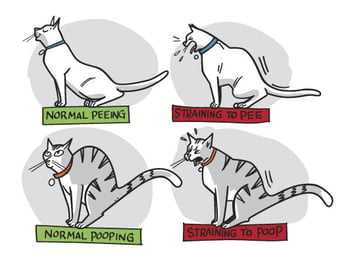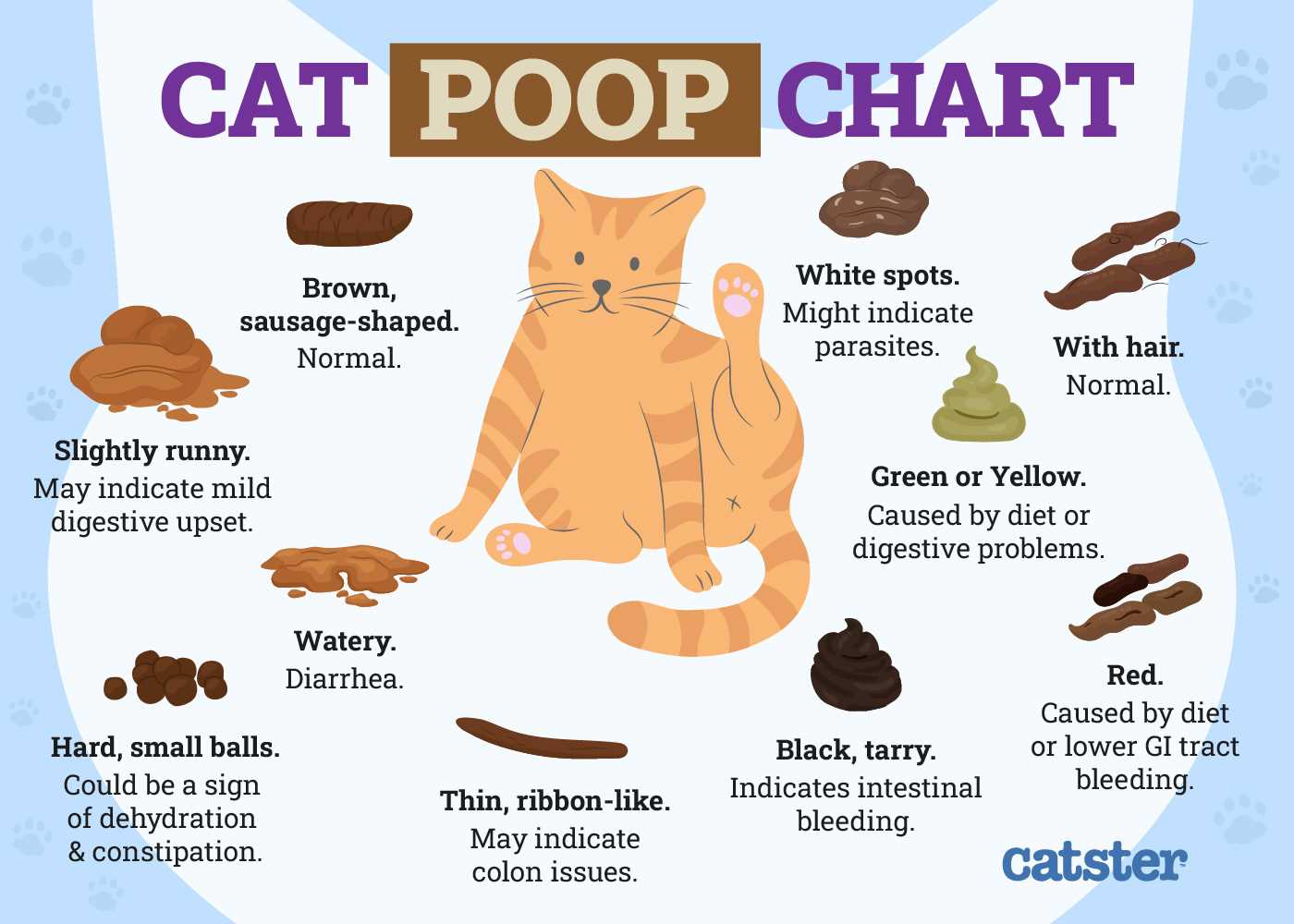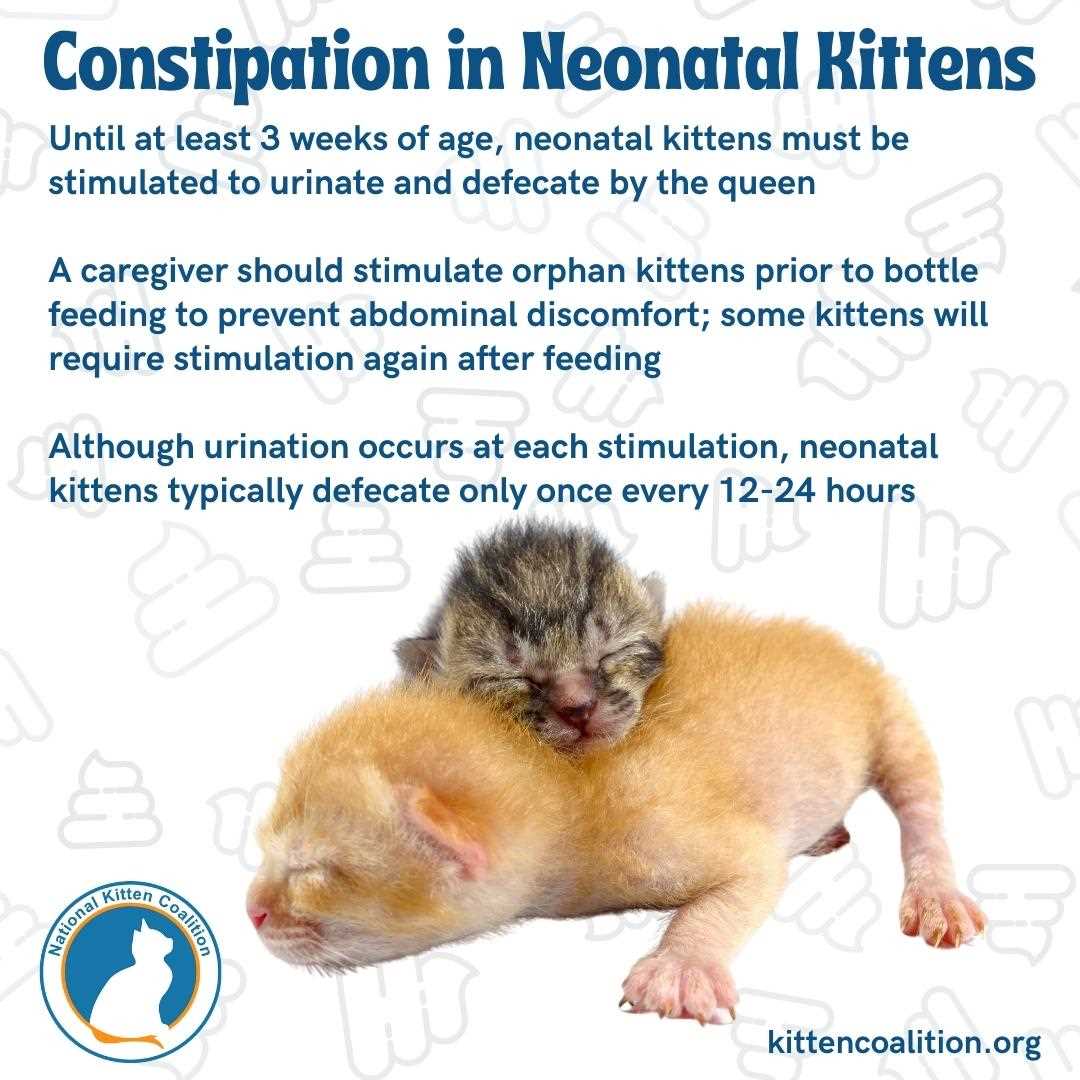To maintain a healthy digestive system, ensure your furry friend has a balanced diet rich in fiber. High-quality cat food containing real meat, combined with vegetables, can significantly aid in preventing bowel discomfort.
Hydration plays a key role in digestion. Always provide fresh water daily to encourage your pet to drink enough. Wet food can also be an excellent addition, as it contributes moisture intake and can help soften stools.
Regular exercise is essential for digestive health. Encourage playtime with toys or interactive games to promote movement, as an active lifestyle helps stimulate bowel function.
If you notice signs of distress, such as straining or infrequent litter box visits, consult with a veterinarian. They can provide tailored advice and determine if a change in diet or additional treatments are necessary.
Monitoring your companion’s health regularly can help catch issues early. Keep an eye on their eating habits, weight, and litter box behavior to ensure everything is functioning properly.
Understanding Feline Digestive Issues
One of the common reasons behind digestive troubles in felines is insufficient hydration. It’s crucial to ensure a steady supply of fresh water, as dehydration can lead to hard stools. Consider incorporating wet food into the diet to enhance moisture intake.
Dietary fibers also play a significant role. While dry kibble is convenient, it might not provide the necessary bulk for smooth digestion. Adding fiber-rich options, such as certain vegetables or specific herbs, can help promote regular bowel movements.
Behavior and Environment
Stress can significantly impact gastrointestinal health. Changes in the household, loud noises, or territorial disputes might contribute to reluctance in using the litter box. Providing a calm and safe environment is essential for maintaining a healthy digestive system.
Regular exercise is another factor that shouldn’t be overlooked. Engaging in playtime not only helps maintain a healthy weight but also stimulates the digestive tract. Ensuring that your furry friend enjoys a balanced diet that they love, such as foods outlined in the article about what they love to eat, can also encourage better digestion.
Common Causes of Feline Constipation

Dehydration is a leading factor in the struggles with bowel movements. Always ensure fresh, clean water is available, as I learned that hydration makes a difference in my daily routine.
Diet plays a significant role as well. Low fiber content in food can lead to hard stools. I recommend choosing a high-quality diet that includes sufficient fiber to keep things moving smoothly.
Inactivity can also be a culprit. Regular playtime helps maintain healthy digestion. I enjoy chasing my toys, and it keeps my tummy happy!
Stress and anxiety might not be obvious, but changes in the environment can impact my well-being. A calm space is essential, especially during transitions like moving or introducing new pets.
Medical conditions such as arthritis can hinder proper posture during litter box visits. Keeping an eye on my mobility has been crucial, as comfort matters when it comes to potty time.
Lastly, certain medications may lead to slower digestive processes. Always consult a veterinarian if new treatments are introduced to ensure they won’t disrupt my routine.
Signs Your Feline Friend May Be Having Trouble

Pay attention to litter box habits. If there’s a significant decrease in visits or if your buddy is straining while trying to relieve themselves, it’s a signal to act. Look for changes in behavior; if your furry companion seems more irritable or hides away, it could indicate discomfort. Watch for signs of abdominal discomfort, like bloating or sensitivity when touched.
Physical Indicators

Observe the feces. Hard, dry stools or small pellet-like droppings are red flags. If there’s any blood present, it’s time to consult a vet. A lack of appetite or drinking less water can also contribute to this issue, so monitor food and water intake closely.
Behavioral Changes
Notice any increase in grooming habits. Excessive licking can sometimes be a response to stress or pain. If your little one is vocalizing more than usual or seems restless, these behavioral shifts may signify a problem. Prompt attention can lead to a resolution and keep your companion comfortable.
To maintain a healthy digestive system, ensure your furry friend has a balanced diet rich in fiber. High-quality cat food containing real meat, combined with vegetables, can significantly aid in preventing bowel discomfort.
Hydration plays a key role in digestion. Always provide fresh water daily to encourage your pet to drink enough. Wet food can also be an excellent addition, as it contributes moisture intake and can help soften stools.
Regular exercise is essential for digestive health. Encourage playtime with toys or interactive games to promote movement, as an active lifestyle helps stimulate bowel function.
If you notice signs of distress, such as straining or infrequent litter box visits, consult with a veterinarian. They can provide tailored advice and determine if a change in diet or additional treatments are necessary.
Monitoring your companion’s health regularly can help catch issues early. Keep an eye on their eating habits, weight, and litter box behavior to ensure everything is functioning properly.
Understanding Feline Digestive Issues
One of the common reasons behind digestive troubles in felines is insufficient hydration. It’s crucial to ensure a steady supply of fresh water, as dehydration can lead to hard stools. Consider incorporating wet food into the diet to enhance moisture intake.
Dietary fibers also play a significant role. While dry kibble is convenient, it might not provide the necessary bulk for smooth digestion. Adding fiber-rich options, such as certain vegetables or specific herbs, can help promote regular bowel movements.
Behavior and Environment
Stress can significantly impact gastrointestinal health. Changes in the household, loud noises, or territorial disputes might contribute to reluctance in using the litter box. Providing a calm and safe environment is essential for maintaining a healthy digestive system.
Regular exercise is another factor that shouldn’t be overlooked. Engaging in playtime not only helps maintain a healthy weight but also stimulates the digestive tract. Ensuring that your furry friend enjoys a balanced diet that they love, such as foods outlined in the article about what they love to eat, can also encourage better digestion.
Common Causes of Feline Constipation

Dehydration is a leading factor in the struggles with bowel movements. Always ensure fresh, clean water is available, as I learned that hydration makes a difference in my daily routine.
Diet plays a significant role as well. Low fiber content in food can lead to hard stools. I recommend choosing a high-quality diet that includes sufficient fiber to keep things moving smoothly.
Inactivity can also be a culprit. Regular playtime helps maintain healthy digestion. I enjoy chasing my toys, and it keeps my tummy happy!
Stress and anxiety might not be obvious, but changes in the environment can impact my well-being. A calm space is essential, especially during transitions like moving or introducing new pets.
Medical conditions such as arthritis can hinder proper posture during litter box visits. Keeping an eye on my mobility has been crucial, as comfort matters when it comes to potty time.
Lastly, certain medications may lead to slower digestive processes. Always consult a veterinarian if new treatments are introduced to ensure they won’t disrupt my routine.
Signs Your Feline Friend May Be Having Trouble

Pay attention to litter box habits. If there’s a significant decrease in visits or if your buddy is straining while trying to relieve themselves, it’s a signal to act. Look for changes in behavior; if your furry companion seems more irritable or hides away, it could indicate discomfort. Watch for signs of abdominal discomfort, like bloating or sensitivity when touched.
Physical Indicators

Observe the feces. Hard, dry stools or small pellet-like droppings are red flags. If there’s any blood present, it’s time to consult a vet. A lack of appetite or drinking less water can also contribute to this issue, so monitor food and water intake closely.
Behavioral Changes
Notice any increase in grooming habits. Excessive licking can sometimes be a response to stress or pain. If your little one is vocalizing more than usual or seems restless, these behavioral shifts may signify a problem. Prompt attention can lead to a resolution and keep your companion comfortable.
To maintain a healthy digestive system, ensure your furry friend has a balanced diet rich in fiber. High-quality cat food containing real meat, combined with vegetables, can significantly aid in preventing bowel discomfort.
Hydration plays a key role in digestion. Always provide fresh water daily to encourage your pet to drink enough. Wet food can also be an excellent addition, as it contributes moisture intake and can help soften stools.
Regular exercise is essential for digestive health. Encourage playtime with toys or interactive games to promote movement, as an active lifestyle helps stimulate bowel function.
If you notice signs of distress, such as straining or infrequent litter box visits, consult with a veterinarian. They can provide tailored advice and determine if a change in diet or additional treatments are necessary.
Monitoring your companion’s health regularly can help catch issues early. Keep an eye on their eating habits, weight, and litter box behavior to ensure everything is functioning properly.
Understanding Feline Digestive Issues
One of the common reasons behind digestive troubles in felines is insufficient hydration. It’s crucial to ensure a steady supply of fresh water, as dehydration can lead to hard stools. Consider incorporating wet food into the diet to enhance moisture intake.
Dietary fibers also play a significant role. While dry kibble is convenient, it might not provide the necessary bulk for smooth digestion. Adding fiber-rich options, such as certain vegetables or specific herbs, can help promote regular bowel movements.
Behavior and Environment
Stress can significantly impact gastrointestinal health. Changes in the household, loud noises, or territorial disputes might contribute to reluctance in using the litter box. Providing a calm and safe environment is essential for maintaining a healthy digestive system.
Regular exercise is another factor that shouldn’t be overlooked. Engaging in playtime not only helps maintain a healthy weight but also stimulates the digestive tract. Ensuring that your furry friend enjoys a balanced diet that they love, such as foods outlined in the article about what they love to eat, can also encourage better digestion.
Common Causes of Feline Constipation

Dehydration is a leading factor in the struggles with bowel movements. Always ensure fresh, clean water is available, as I learned that hydration makes a difference in my daily routine.
Diet plays a significant role as well. Low fiber content in food can lead to hard stools. I recommend choosing a high-quality diet that includes sufficient fiber to keep things moving smoothly.
Inactivity can also be a culprit. Regular playtime helps maintain healthy digestion. I enjoy chasing my toys, and it keeps my tummy happy!
Stress and anxiety might not be obvious, but changes in the environment can impact my well-being. A calm space is essential, especially during transitions like moving or introducing new pets.
Medical conditions such as arthritis can hinder proper posture during litter box visits. Keeping an eye on my mobility has been crucial, as comfort matters when it comes to potty time.
Lastly, certain medications may lead to slower digestive processes. Always consult a veterinarian if new treatments are introduced to ensure they won’t disrupt my routine.
Signs Your Feline Friend May Be Having Trouble

Pay attention to litter box habits. If there’s a significant decrease in visits or if your buddy is straining while trying to relieve themselves, it’s a signal to act. Look for changes in behavior; if your furry companion seems more irritable or hides away, it could indicate discomfort. Watch for signs of abdominal discomfort, like bloating or sensitivity when touched.
Physical Indicators

Observe the feces. Hard, dry stools or small pellet-like droppings are red flags. If there’s any blood present, it’s time to consult a vet. A lack of appetite or drinking less water can also contribute to this issue, so monitor food and water intake closely.
Behavioral Changes
Notice any increase in grooming habits. Excessive licking can sometimes be a response to stress or pain. If your little one is vocalizing more than usual or seems restless, these behavioral shifts may signify a problem. Prompt attention can lead to a resolution and keep your companion comfortable.






